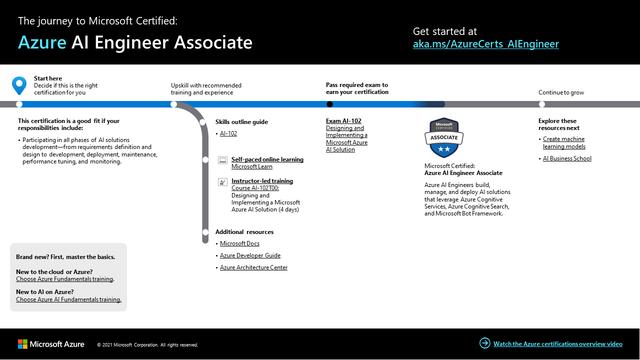Skills to Become Microsoft AI Engineer
Microsoft AI Engineers are proficient Software Developers with proficiency in Microsoft AI platform, intelligent applications and training Machine Learning or Deep Learning models on Azure. Professionals aspiring for expanding career as Microsoft AI Engineer should have hands-on expertise on Azure Machine learning, Databricks, ONNX, and Knowledge mining, leveraging Azure cognitive search, cognitive services, and bots.
Apart from being expert in core Microsoft AI platform the person should pursue a deep understanding of core AI algorithms and models like Linear regression, Logistic regression, Linear Discriminant Analysis, Decision trees, Naive Bayes, K-Nearest Neighbors, Learning vector quantization, Support vector machines, Bagging and random forest and Deep neural networks.
Since recent AI applications are using microservices architecture across Cloud platforms to ensure improved availability, manageability, performance, and security, the candidate aspiring to design and develop AI-equipped applications should be comfortable on microservice development on industry-leading microservices frameworks be it Spring, Swagger, Jersy or Python Microservice development framework.
Read more: Top 10 AI-Powered Telecom Companies in World
Skills Needed to Become a Microsoft AI Engineer
Job as a Microsoft AI engineer predominantly includes development, deployment, and support for AI-equipped application so its prerequisite that person should have deep programming experience in Python, Java, Node JS, Angular, HTML, CSS, JavaScript, though programmer doesn’t need to have expertise on the knowledge of syntax and semantics.
Related Posts
Ravin AI Launches ‘Inspect Trade’ Bringing Advanced Digital Vehicle Inspection to Car Dealerships
ParcelShield Launches’ SmartView
Allied National Selects Gradient AI to Streamline its Group Health Underwriting Process to Support Strategic Growth
PrevNext 1 of 1,838Apart from development experience, an AI engineer should have exposure to operations and support for AI applications. It is recommended that the person should be able to create CI/CD pipelines using Azure Boards, Azure Pipelines, Azure Repos, Azure Test Plans and Azure Artifacts on Microsoft Azure ore parallel DevOps platforms from other Cloud providers.
Since AI applications are exposed to end-users and need immense amounts of data to be transferred from Edge to Cloud for training models, Microsoft AI engineers should have a conceptual understanding of Azure security guidelines throughout the development lifecycle of AI applications.
AI applications are mostly three-tier web applications or progressive web apps based on distributed systems on Virtualized or Cloud platforms so, Microsoft Azure engineers should be able to understand critical aspects of intelligent applications like Docker containers, Kubernetes platforms, and Kafka or other messaging queueing data structures, multithreading, object-oriented development, distributed applications, client-server architecture.
Apart from application architecture consumption is the most critical aspect in AI application stack which demands a deep understanding of secure data access models leveraging Rest APIs for consuming data hosted server and running training models asynchronously with encryption and certificate-based authentication and authorization. Artificial Intelligence applications are predominantly based on training models and based on data it depends on which framework to use to train data.
A professional aspiring to become AI Engineer should be aware of core AI use cases like Machine Learning, Deep Learning, Neural Networks, Natural Language Processing, and Autonomous systems and should have expertise to implement them on Microsoft AI platform with real-time experience on AI native frameworks like TensorFlow, Keras, sci-kit-learn, Theano, Caffe, PyTorch, MxNet, AutoML, OpenNN, CNTK to end process for training structured and unstructured data using Supervised Learning, unsupervised learning, and reinforcement learning.
Read more: AI Applications in Aviation and Travel Industry








